
JOURNAL OF REGULATORY ECONOMICS
Scope & Guideline
Pioneering Research in the Economics of Regulation
Introduction
Aims and Scopes
- Regulatory Analysis and Frameworks:
This area encompasses studies that analyze existing regulatory frameworks, their effectiveness, and the implications of regulatory changes on various sectors, including energy, transportation, and healthcare. - Cost-Benefit Analysis:
A consistent focus on the methodologies of cost-benefit analysis, particularly in the context of public policy and regulatory decisions, evaluating the economic impacts of regulations. - Market Dynamics and Competition:
Research in this scope addresses the competitive effects of regulatory measures, including studies on market entry, monopolistic practices, and the impact of deregulation on industry dynamics. - Environmental Economics and Regulation:
This focus area investigates the intersection of environmental policy and economic regulation, emphasizing sustainable practices and the economic implications of environmental regulations. - Public Policy and Economic Outcomes:
The journal frequently publishes studies that link regulatory decisions with broader economic outcomes, including impacts on entrepreneurship, investment, and market efficiencies.
Trending and Emerging
- Digital Economy and Regulation:
With the rise of the digital economy, there is growing interest in how regulations adapt to technological advancements and their implications for market competition and consumer protection. - Energy Transition and Regulation:
Research focusing on the regulatory implications of energy transition, particularly in renewable energy sectors, is gaining momentum, highlighting the economic impacts of shifting energy policies. - Asymmetric Information in Regulation:
Emerging studies are increasingly addressing issues related to asymmetric information in regulatory contexts, particularly in relation to market entry and competitive behavior. - Interdisciplinary Approaches to Regulation:
There is a trend towards interdisciplinary research that combines insights from economics, political science, and environmental studies to provide a more holistic view of regulatory impacts. - Social Equity in Regulation:
Emerging themes are focusing on social equity and the implications of regulation on various demographics, particularly in relation to occupational licensing and access to markets.
Declining or Waning
- Traditional Regulatory Approaches:
Research focusing on traditional regulatory frameworks appears to be waning, as newer methodologies and innovative regulatory practices gain traction in the literature. - Sector-Specific Regulations:
There has been a noticeable decline in papers addressing sector-specific regulations, particularly those that do not intersect with broader economic implications or cross-sectoral analyses. - Basic Regulatory Compliance Studies:
Studies that primarily focus on compliance without a rigorous economic analysis or implications have become less frequent, as the journal shifts towards more integrative and analytical approaches.
Similar Journals

Review of Law & Economics
Fostering Insightful Dialogues on Legal and Economic Intersections.Review of Law & Economics, published by WALTER DE GRUYTER GMBH, serves as a pivotal platform in the intersecting realms of law and economics, with its open access policy initiated in 2016 to promote wider dissemination of research. Based in Germany, this journal aims to foster insightful discussions and innovative research that bridge the gap between legal frameworks and economic principles. With an impact factor reflected in its Q2 rank in Law and Q3 rank in Economics, Econometrics and Finance as per the 2023 category quartiles, it positions itself as a significant contributor to scholarly works in both fields. The journal's unique approach highlights a comprehensive analysis of legal issues through an economic lens, making it invaluable for researchers, professionals, and students alike. As it encompasses a broad spectrum of topics from regulatory analysis to market dynamics, the *Review of Law & Economics* continues to be a vital resource for those seeking to enhance their understanding and application of law in economic contexts, with converged years extending from 2005 to 2024.
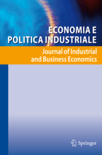
Journal of Industrial and Business Economics
Driving discussions on contemporary economic challenges.Journal of Industrial and Business Economics, published by SPRINGER NATURE, is a premier scholarly journal focused on disseminating cutting-edge research and practical insights within the fields of industrial and business economics. With an impact factor that reflects its importance globally, the journal serves as a vital resource for researchers, professionals, and students, contributing to advancements in knowledge and practice in business management, economics, and econometrics. The journal is recognized in the Q2 and Q1 quartiles across various categories, demonstrating its rigorous peer-review process and relevance, with notable rankings in both the Economics and Business Management categories. Its rich selection of articles drives discussions critical for understanding contemporary economic challenges and business strategies. For those seeking to stay informed in this evolving field, the Journal of Industrial and Business Economics is indispensable, providing a platform for innovative thought and scholarly exchange.
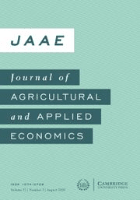
Journal of Agricultural and Applied Economics
Unlocking potential through rigorous peer-reviewed research.The Journal of Agricultural and Applied Economics, published by Cambridge University Press, stands as a leading platform for disseminating innovative research in the fields of agriculture, economics, and applied sciences. With an impressive impact factor and a prestigious Q1 ranking in Agricultural and Biological Sciences and Q2 in Economics, this journal is recognized for its rigorous peer-reviewed content that addresses contemporary challenges in agricultural and economic policies. Since its transition to Open Access in 2015, it has widened its reach, allowing scholars, practitioners, and students unrestricted access to vital research findings. The journal's scope encompasses a wide array of topics, fostering interdisciplinary dialogue and offering insights essential for informed decision-making in the agricultural sector. Addressing critical issues from food security to sustainable practices, the Journal of Agricultural and Applied Economics is instrumental for anyone seeking to contribute to the advancement of knowledge in these pivotal areas.

REVIEW OF INDUSTRIAL ORGANIZATION
Unveiling the complexities of competition and regulation.REVIEW OF INDUSTRIAL ORGANIZATION, published by SPRINGER, is a premier journal dedicated to advancing the field of industrial organization and related disciplines. With its ISSN 0889-938X and E-ISSN 1573-7160, this esteemed publication supports the dissemination of high-quality research from 1984 to the present, encompassing a wide range of topics such as economics, technology management, and organizational behavior. Positioned in the Q2 category across multiple disciplines, including Economics and Econometrics, Strategy and Management, and Organizational Behavior, it reflects its impactful contributions to academia and business practice. The journal provides valuable insights for researchers, practitioners, and students interested in the dynamics of market structures, competition, and regulatory issues. As part of the Scopus database, it ranks favorably, allowing authors to contribute to a recognized platform that drives innovation and policy in the industrial sector. While it does not offer open access, the journal's robust editorial standards ensure that published work meets rigorous scholarly criteria, making it an essential resource for those aiming to deepen their understanding of industrial organization.

Netnomics
Empowering Research in the Evolving EconomyNetnomics, published by SPRINGER, is a pivotal academic journal focusing on the intersection of economics, computer networks, and information systems. With its ISSN 1385-9587 and E-ISSN 1573-7071, this journal strives to address current trends and research challenges in the digital economy, effectively capturing the dynamics of online markets and digital goods. Although open access options are not available, Netnomics maintains an impressive standing, ranking in the Q3 category for its fields in Computer Networks and Communications, Economics and Econometrics, and Information Systems. Despite its discontinuation of coverage in Scopus from 2005 through 2021, the journal continues to contribute valuable insights, making it a relevant source for researchers, professionals, and students eager to explore the evolving landscape of economic interactions in a digitalized world. With a focus on empirical research and theoretical analysis, Netnomics provides a platform for advancing knowledge at the confluence of technology and economic theory, critical for professionals navigating the complexities of today's economy.
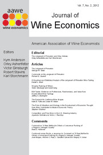
Journal of Wine Economics
Decoding the Business of Wine, One Study at a TimeJournal of Wine Economics, published by Cambridge University Press, is a leading interdisciplinary journal dedicated to advancing the understanding of the economics of wine through rigorous research and analysis. With an ISSN of 1931-4361 and E-ISSN 1931-437X, this journal plays a crucial role in the intersection of economics, business, and food science, offering insights relevant to both academia and industry. The journal has garnered recognition, achieving a Q2 ranking in the categories of Business, Management, and Accounting, Food Science, and Horticulture, as reflected in its Scopus rankings, with significant placement in the percentile rankings within these fields. As of 2023, it continues to contribute to the online discourse on wine economics while fostering a collaborative environment for researchers, professionals, and students interested in the intricacies of this vibrant sector. Although it does not currently provide open access options, readers can engage with its valuable content through academic libraries and institutional subscriptions, making it an essential resource for those seeking to deepen their expertise in wine economics.

JOURNAL OF TRANSPORT ECONOMICS AND POLICY
Illuminating economic insights in transportation dynamics.JOURNAL OF TRANSPORT ECONOMICS AND POLICY is a prominent academic journal published by the University of Bath, dedicated to advancing the field of transport economics and related policy issues. Since its inception, this journal has been a pivotal platform for disseminating high-quality research, with a focus on economic theories, analytical methods, and policy implications within the transport sector. With a robust historic timeline of publication spanning from 1982 to the present, the journal boasts a commendable Q3 ranking in esteemed categories including Economics and Econometrics, Management, Monitoring, Policy and Law, and Transportation as of 2023. Although currently not open access, it remains an essential resource for researchers and professionals keen on exploring intricate economic mechanisms that drive transport systems globally. The journal's contributions are crucial for enhancing policy development and fostering informed decision-making among stakeholders, ensuring its significance in shaping future transport economics discourse.
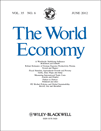
WORLD ECONOMY
Elevating discussions on pressing economic issues worldwide.WORLD ECONOMY is a premier academic journal published by Wiley, renowned for its rigorous peer-reviewed research in the fields of economics, finance, accounting, and political science. Established in 1977, the journal has consistently contributed to the advancement of knowledge, reflected in its strong standing across various category quartiles, notably achieving Q1 in Accounting and Political Science, and ranking in the top quartile in its respective disciplines as of 2023. With an audience that spans researchers, professionals, and students, WORLD ECONOMY publishes impactful articles that explore critical issues affecting the global economy. Although it is not an open-access publication, readers have access options to engage with cutting-edge research that addresses both theoretical and practical aspects of world economic trends. The journal's commitment to excellence is further underscored by its impressive Scopus rankings, situating it among the top journals in the social sciences arena. For anyone keen on deepening their understanding of the dynamics shaping our economic landscape, WORLD ECONOMY remains an indispensable resource.

Transformations in Business & Economics
Driving excellence in research across business and social sciences.Transformations in Business & Economics is an esteemed academic journal published by VILNIUS UNIV, dedicated to advancing knowledge in the fields of business, economics, and social sciences. With a focus on multidisciplinary research, the journal spans critical themes including international management, marketing strategies, economic policies, and political science, making it a vital resource for researchers and practitioners alike. Ranking in the Q2 and Q3 categories of various Scopus metrics reflects the journal's commitment to quality and relevance. Furthermore, the journal aims to foster innovative ideas and collaborations that address contemporary economic challenges and business practices. Although it operates under traditional access, its inclusive scope spans from 2006 to 2024, ensuring that findings remain pertinent for future scholarly pursuits. Researchers and students seeking rigorous insights will find Transformations in Business & Economics an invaluable addition to their academic library.
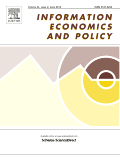
INFORMATION ECONOMICS AND POLICY
Illuminating the nexus of information and policy.INFORMATION ECONOMICS AND POLICY, published by ELSEVIER, serves as a leading scholarly journal in the realms of Economics and Econometrics and Management, Monitoring, Policy and Law. With a consistent publication history dating back to 1983, this journal is revered for its rigorous analysis and comprehensive studies that examine the interplay between information technologies and economic frameworks, contributing vital insights to both academia and industry. With an impressive Q1 category ranking in its respective fields for 2023, it occupies a prominent position among peer-reviewed journals, demonstrating its impact and relevance in shaping policy and understanding within the economic landscape. Although the journal is not Open Access, its rich repository of scholarly articles is invaluable for researchers, professionals, and students seeking to enhance their understanding of information economics and its implications. For those invested in shaping policy and advancing research, INFORMATION ECONOMICS AND POLICY remains an essential resource that fosters significant academic discourse and innovation.